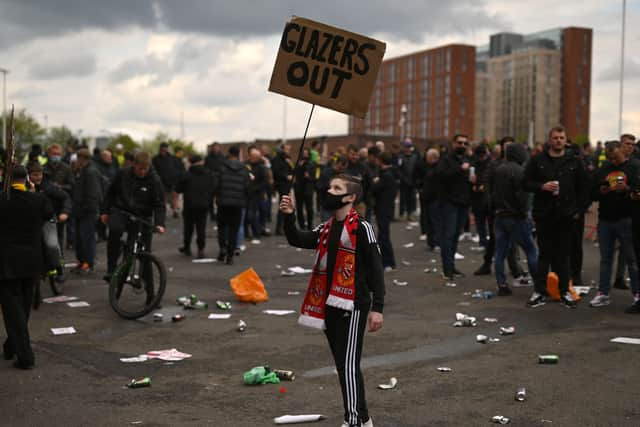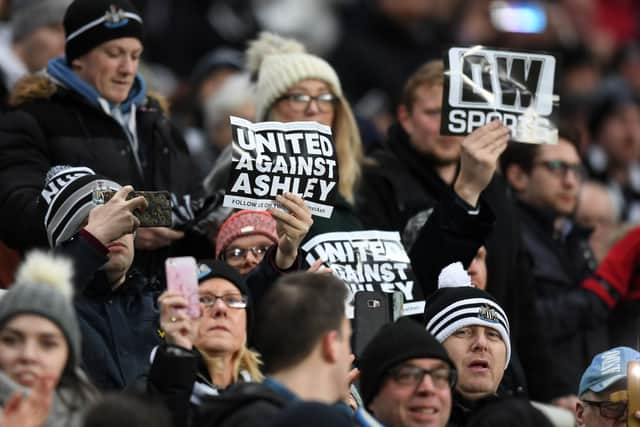Bayern Munich supporters are showing Newcastle, Man Utd and Man City fans how to fight sportswashing
and live on Freeview channel 276
Something rather remarkable happened on Wednesday in Germany, and it deserves more attention than it has received so far. Bayern Munich announced the cessation of their sponsorship partnership with Qatar Airways – the state-run aviation company – and they did so solely because of pressure from their own fans. It is perhaps the first time that fans have won a victory against the practice of sportswashing – a small but maybe significant step in a new and better direction.
Fans of the Bavarian giants have been organising for some time against Bayern’s lucrative deal with Qatar – which was worth a reported €20m per year – and their efforts are impressive. They organised public debates with professionals who had been researching working conditions in Qatar. They raised funds to bring Nepalis who had previously been migrant workers there to Germany to discuss their experiences with local politicians. They held documentary film screenings to raise awareness.
Advertisement
Hide AdAdvertisement
Hide AdDuring the course of the build-up to the 2022 World Cup, much was made of Qatar’s appalling track record of human rights abuses, especially with regard to its shocking treatment of low-wage migrant workers who are brought in en masse to help with the wealthy state’s endless construction projects, including the stadia for the World Cup, and exploited ruthlessly. Awareness was raised and pressure brought to bear from many quarters, but ultimately Qatar won out – FIFA didn’t budge, they hosted their World Cup, had their month in the spotlight, and will no doubt reap the benefits. At the same time, their state ownership of Paris Saint-Germain remains unchallenged.


Countries like Qatar and Saudi Arabia are pouring billions into sports as part of a broader plan to portray their countries as both pleasant, modernised places to holiday and hubs of global business. This is all part of a strategy for petrostates to diversify their portfolios as oil reserves gradually run dry and the world moves, painfully slowly, towards a more carbon-conscious era. All of which is fine, but both countries are guilty of horrific abuses of both their workforces and citizens, and of stripping many of their own people of basic rights, especially women and members of the LGBTQ+ community. In allowing them to use sport, including football, to bury those truths and present a cleaner image, many organisations in the game are permitting a washing away of some abhorrent practices and supporting the persecution of minorities.
Fans of several clubs in Europe are now faced with the same moral dilemma that FIFA decided to shrug off. Manchester City are owned by Abu Dhabi. 80% of Newcastle United now belongs to the Saudi Public Investment Fund. Manchester United may soon be owned by a Qatari Sheikh, with some debate over whether his bid is backed directly by state money or not. Arsenal have sponsorship deals with both Dubai and Rwanda.
The question is begged – what can fans who wish to stand up to ownership by human rights abusers do? How can they make a difference against the untold billions of some of the richest countries in the world? Fans in England have no say in who buys and sells their clubs, after all, and sponsorships are organised in boardrooms, well away from areas in which even the biggest fan groups have significant influence. Fans are not to blame for the dirty money filtering into the game.
Advertisement
Hide AdAdvertisement
Hide AdBut there are some who have stood up anyway. In November, a small protest was organised by Newcastle fans against their Saudi owners outside St. James’ Park ahead of a match against Chelsea. Some Manchester United fans have already begun organising against the potential Qatari takeover, taking a banner reading “No Qatari sportswashing” to a match against Southampton in March. They represent a minority of fans, but they are nevertheless admirably determined to spread their message.
But until Wednesday, no fan protests had achieved any substantial gains against sportswashing – but now Bayern have shed €20m a year in order to bow to the demands of their own supporters. It’s proof that sufficient pressure by fans really can make a difference to even the biggest and wealthiest powerhouses of the European game.
There are differences, of course. The German 50+1 fan ownership model means than supporters are far more involved in the affairs of the club and have a much larger say. They’re used to scrutinising board-level decisions and making their voices heard in a way that British fans simply aren’t, having been frozen out of the running of clubs pretty much since the earliest days of the modern game.
But fans have gathered to protest before, even if the efficacy has been varied. United fans have repeatedly and vocally opposed the Glazers, as Newcastle fans did against former owner Mike Ashley. When plans for a European Super League were announced, it was the immediate fan response, including large-scale protests outside the grounds of the English clubs involved, that derailed the breakaway attempt. It was the single biggest victory for fans against corporate greed in the modern era, and should serve as an inspiration as fans fight against the other evils that big money has brought to the game.
Advertisement
Hide AdAdvertisement
Hide AdOf course, there is the issue that many fans simply seemed to care more about the Super League than they have so far about sportswashing (or gambling sponsorship, or multi-club ownership, and so on) – and it’s noticeable that many fans have been happy to welcome sportswashers when the price is right. While some Newcastle fans have protested against the Saudi PIF’s involvement in their club, many have openly celebrated it and even abused the protestors on social media.
The real lesson that can be taken from the success of Bayern Munich fans is the power not just of organisation but of communication. In hosting events which brought fans together and explained what was happening in Qatar in an engaging fashion, they brought people who might not have otherwise cared on side, and added their voices to their own petitions. In English football, where fan groups are smaller and mass fan organisation less prevalent, it will be harder to get people together in the same way – but it probably can be done, and the attempt should be made.


Nobody should blame fans of Newcastle, or Manchester City, or any other clubs with questionable owners of any kind (and in the age when only the very wealthiest can own a football club, there are few owners who are beyond scrutiny) for being delighted with the success that those vast influxes of wealth have brought. City have gone from also-rans to champions of Europe. Newcastle have gone from a club teetering on the edge of yo-yo status to the top four in the blink of an eye. Money talks, and builds some damned good teams. But fans can enjoy that success and still push back against the root of the problem.
While Saudi Arabia, the UAE and Qatar use the game to launder their public image, imagine if the fans in the stands were carrying banners criticising their human rights records, or standing up for the minoritised communities of the Middle East. Imagine if part of the bargain for these new owners was that they had to accept protests not necessarily against their ownership, but against their practices. As Saudi Arabia beams Newcastle games into homes across their country and proudly display their soft power, imagine if the pictures came with banners supporting LGBTQ+ rights or speaking out against antisemitism.
Advertisement
Hide AdAdvertisement
Hide AdThe fans have power, something that too many have forgotten. Fans could stand up for the people whose rights are abused by their owners, and perhaps that will put pressure on those states to enact real changes in order to maintain the image of modernised, pleasant and eminently visitable countries to the wider world. Perhaps if the pressure on Qatar lasted for years from PSG and perhaps Manchester United fans (rather than for a couple of months around the World Cup) then that pressure could result in improved rights for workers or for gay Qataris.
We want your feedback on 3 Added Minutes - details here
Perhaps that’s a fantasy. Perhaps the money will always win and the powers involved are too strong. But Bayern fans have taken a small step in pushing back, and won. That is an inspiring start, and a ball that needs to keep rolling.
Comment Guidelines
National World encourages reader discussion on our stories. User feedback, insights and back-and-forth exchanges add a rich layer of context to reporting. Please review our Community Guidelines before commenting.
